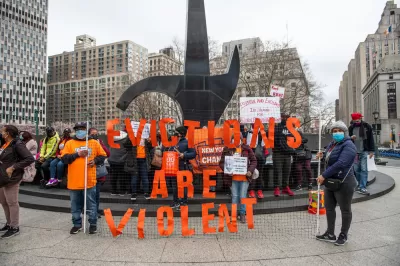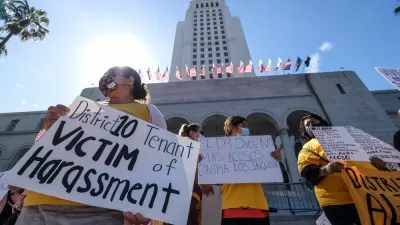Some of the nation’s longest-lasting eviction protections are set to expire in February, while the future of other renter assistance programs remains uncertain.

Los Angeles tenants will no longer be covered under COVID-era eviction protections starting February 1, reports Liam Dillon in the Los Angeles Times. “The decision will end some of the longest-lasting tenant protections in the nation, first passed in March 2020 as part of the emergency response to the COVID-19 pandemic. Since then, landlords have not been allowed to evict their tenants for most reasons, including if the owners wanted to move into their own homes.”
Landlords can also resume raising rents in the city’s 650,000 rent-controlled apartments. “In some cases, renters will be permanently barred from eviction for those old debts, though landlords can try to recover the money in small claims court. In other cases, tenants who are now behind will have at least until August before they can be evicted.”
However, they also must adhere to other new regulations, passed in October. As Dillon explains, “Most notably, landlords would no longer be allowed to evict tenants in any rental property, including single-family homes, unless there was unpaid rent, documented lease violations, owner move-ins or other specific reasons.”
Tenant advocates say continued protections are needed to mitigate the long-lasting effects of pandemic-related job losses and the rise in housing costs in the last few years, while landlords say they need to begin evicting or charging tenants to stay in business.
FULL STORY: L.A. confirms end of COVID eviction rules, while other tenant protections remain in limbo

Planetizen Federal Action Tracker
A weekly monitor of how Trump’s orders and actions are impacting planners and planning in America.

San Francisco's School District Spent $105M To Build Affordable Housing for Teachers — And That's Just the Beginning
SFUSD joins a growing list of school districts using their land holdings to address housing affordability challenges faced by their own employees.

The Tiny, Adorable $7,000 Car Turning Japan Onto EVs
The single seat Mibot charges from a regular plug as quickly as an iPad, and is about half the price of an average EV.

Seattle's Plan for Adopting Driverless Cars
Equity, safety, accessibility and affordability are front of mind as the city prepares for robotaxis and other autonomous vehicles.

As Trump Phases Out FEMA, Is It Time to Flee the Floodplains?
With less federal funding available for disaster relief efforts, the need to relocate at-risk communities is more urgent than ever.

With Protected Lanes, 460% More People Commute by Bike
For those needing more ammo, more data proving what we already knew is here.
Urban Design for Planners 1: Software Tools
This six-course series explores essential urban design concepts using open source software and equips planners with the tools they need to participate fully in the urban design process.
Planning for Universal Design
Learn the tools for implementing Universal Design in planning regulations.
Smith Gee Studio
City of Charlotte
City of Camden Redevelopment Agency
City of Astoria
Transportation Research & Education Center (TREC) at Portland State University
US High Speed Rail Association
City of Camden Redevelopment Agency
Municipality of Princeton (NJ)





























